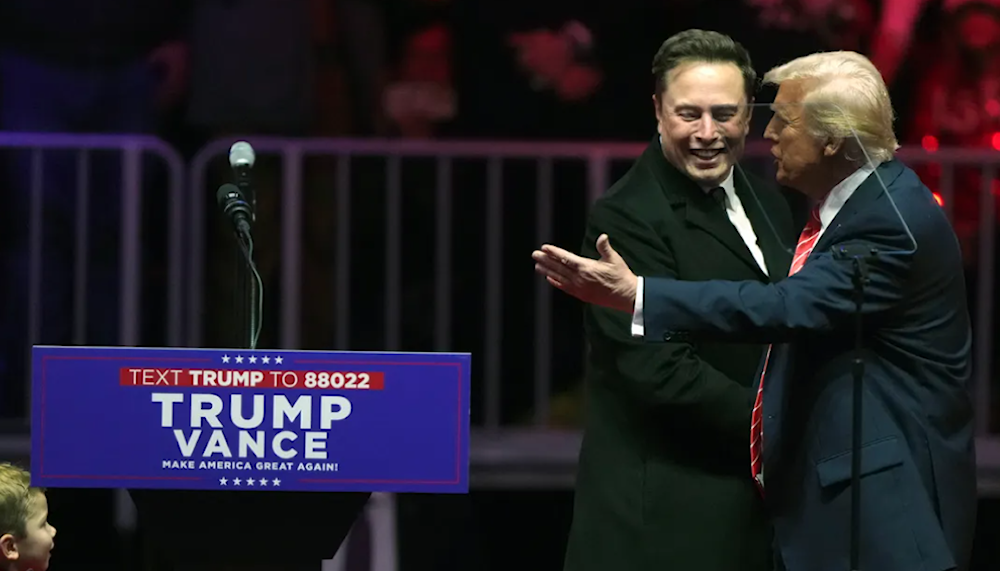Musk’s DOGE to be sued minutes after Trump inauguration
A lawsuit filed by the National Security Counselors alleges that Elon Musk's Department of Government Efficiency (DOGE) violates federal transparency laws.
-

Elon Musk, with his son X Æ A-Xii, arrives on the dais with President-elect Donald Trump, at a rally ahead of the 60th Presidential Inauguration, Sunday, Jan. 19, 2025, in Washington. (AP)
A lawsuit alleging that Elon Musk's Department of Government Efficiency violates federal transparency laws will be filed shortly after President-elect Donald Trump's inauguration on Monday, initiating a legal challenge over a central aspect of the new administration’s agenda.
The 30-page complaint, obtained by The Washington Post, is from the public interest law firm National Security Counselors, which argues that the non-governmental DOGE panel is violating a 1972 law requiring executive branch advisory committees to adhere to disclosure, hiring, and other regulatory practices.
After his election, Trump appointed Elon Musk and Vivek Ramaswamy to lead DOGE, tasked with identifying government regulations and spending programs to cut. Operating out of SpaceX’s Washington offices, DOGE has hired dozens of staff and is sending representatives to US agencies to compile recommendations.
A lawsuit claims that DOGE should be classified as a "federal advisory committee" (FACA), which requires transparency, balanced representation, and other legal obligations that DOGE allegedly has not met.
"DOGE is not exempted from FACA's requirements," argued Kel McClanahan, executive director of National Security Counselors, in the case. "All meetings of DOGE, including those conducted through an electronic medium, must be open to the public."
Musk frequently attacks the notion of "lawfare" on social media, claiming that his opponents utilize esoteric or technical legal issues to delegitimize him or prevent his firms from operating for political purposes. He has claimed that increased expenditure and regulations in the United States are stifling the economy, posing an existential threat to the country, according to him and Ramaswamy.
FACA has faced criticism for imposing strict requirements on private individuals seeking to improve the government and courts aim to balance transparency with the White House's practical needs and private groups' expression limits.
The lawsuit highlights that none of DOGE’s 17 identified members, including tech executives like Marc Andreessen and Baris Akis, are federal employees or represent the interests of federal workers, which it argues violates legal requirements for federal advisory committees.
The case requests that the court rule that any report generated by DOGE "does not reflect the views of a lawfully constituted advisory committee" and prohibit Musk, Ramaswamy, and "all of DOGE's subunits" from undertaking any further official activity until they comply with FACA. The complaint also claims that the White House should be banned from following DOGE's recommendations.
McClanahan told The Washington Post that DOGE "can't exist without following the law," adding that "if DOGE turns around and complies with FACA, the case is over."
Ramaswamy to leave DOGE
Meanwhile, POLITICO reported that Vivek Ramaswamy is leaving Donald Trump's Department of Government Efficiency to run for governor of Ohio, according to a source close to him who requested anonymity to talk freely.
Ramaswamy's departure clears the way for Musk, Trump's top contributor and confidant, to oversee DOGE. The resignation also comes after Ramaswamy irritated certain Republicans in the MAGA movement.
According to POLITICO, Ramaswamy might quit from DOGE before mounting a candidacy. Ramaswamy also met with Ohio Gov. Mike DeWine this month to discuss replacing the Senate seat vacated by Vice President-elect JD Vance, but DeWine chose Lt. Gov. Jon Husted instead.
According to a source close to Ramaswamy, he plans to launch his gubernatorial campaign next week.

 4 Min Read
4 Min Read








